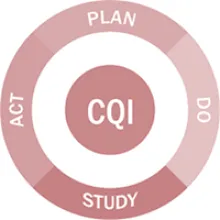The Interim Review Process is the signature component of the COM-Tucson's CQI system linked to accreditation and supports the creation of an internal culture of quality.
Overview
The Interim Review Process (IRP) is conducted at the midpoint of the full 8-year accreditation term. The dean constitutes an ad hoc committee of faculty, students, department chairs, and administrators to carry out a year-long, in-depth review of the medical education program to ensure compliance with the LCME accreditation standards and determine areas where we are performing exceptionally well, areas for improvement, and opportunities for growth and distinguishing our program.
Introduction
The Interim Review Process (IRP) was adapted from the Association of Faculties of Medicine of Canada (AFMC) Interim Accreditation Survey Guide. The IRP includes three (3) primary steps, as shown in the Figure below, although these are not discrete. Since the COM-T is committed to continuous improvement and refining, the steps may overlap. For example, as CQI Projects are completed, the DCI will require continuous updating.
Three (3) Steps in the IRP

Step 1
DCI
Data Collection Instrument
Collect data and draft narrative responses

Step 2
Self-Study
Determine compliance
Recommend CQI projects

Step 3
CQI Projects
Complete improvement projects
Update the DCI
Six (6) Components of the IRP
There are six (6) components of the Interim Review Process (IRP) summarised as follows:
- Director, Accreditation – The person who oversees accreditation and coordinates the IRP
- Interim Self-Study Team - The ad hoc committee of representatives from the College's constituents who review and determine the performance in each accreditation element.
- Data Collection Instrument (DCI) - The questionnaire provided by the LCME accreditation body that contains questions related to each accreditation element.
- Checklists – This evaluation tool permits the Interim Self-study Team to determine (and document) whether the educational program meets the requirements of the elements of each of the accreditation standards.
- Mid-Cycle Survey – This is the self-study review that is conducted at the mid-point of the 8-year accreditation cycle by the Interim Self-study Team.
- Monitoring & Continuous Quality Improvement Projects – These are projects that are initiated based from the findings and recommendations via the mid-cycle survey.
#1 Director, Accreditation
The Director for Accreditation at the COM-T serves as the coordinator for the interim self-study process. This person reports to the most senior education dean and is the liaison to the Tucson Educational Policy Committee on accreditation matters. The Director is responsible for staying current about changes to the LCME accreditation standards and their application thereof, and best practices for compliance, the self-study process, and integration of the continuous quality improvement system in program evaluation.
#2 Interim Self-study Team
Members are selected on their elected or appointed positions in which they are currently serving on COM-T faculty/student committee. Every effort is made to compose the self-study team that is representative of the College's constituents to ensure varied perspectives and input in the review process.
#3 Data Collection Instrument (DCI)
The Data Collection Instrument is a questionnaire published by the Liaison Committee on Medical Education (LCME) that contains questions related to each accreditation element. Some questions require narrative explanations and others require quantitative information. The Director, with the authorization from the Interim Self-study Committee, collects responses from the appropriate offices/units and is responsible for compiling the updated responses into one DCI document for the Interim Self-study Committee.
#4 Checklists
The checklist tool structures the Interim Self-study Team review of the COM-T's performance in meeting the requirements of the elements of each of the standards.Through the review process, the Team identify gaps in compliance and areas that require improvement or monitoring, which will be noted in the findings section of the checklists. In addition, the Interim Self-study Team may make recommendations for a CQI projects, which are also documented on the checklists.
#5 DCI Data Collection & Interim Self-study (Mid-Cycle)
The corresponding sections of the Data Collection Instrument (DCI) for each element are assigned and distributed to the individuals most responsible for that aspect of the program. The lead administrator presents a summary of their findings (quantitative data and narrative responses) that they collected for their assigned DCI sections, and provides a preliminary assessment of areas that are exceptional, in need of improvement and/or gaps in compliance. The Interim Self-Study Team discusses the findings and determines the COM-T's compliance. Their review is structured and documented by completing the checklists, as explained in #4 above. Upon completing the review of the COM-T's compliance with the LCME accrediation standards, an Interim Survey Report is drafted and the completed checklists are included as appendices.
#6 Interim Accreditation Report & Follow-up

The Interim Accreditation Report is formative and belongs to the faculty. The report
documents the extent to which the medical school currently meets the requirements of all accreditation elements. The evaluation forms for elements that are rated as unsatisfactory or those that are rated as satisfactory with the need for monitoring also include recommendations on what needs to be done and by whom. The report also indicates priorities and timelines for CQI projects. The Director for Accreditation monitors each area and reports to the Deputy Dean for Education and key medical school committees on progress in addressing these elements. Monitoring continues and leads into the start of the COM-T’s Self Study for the next full survey. The COM-T's Quality Improvement Cycle shows the entire timeline starting with the last LCME full survey visit at time zero (T-0) through the Interim Review Process and ending with preparation for the next LCME full survey visit (T+8) which is when the COM-T is up for re-accreditation.

